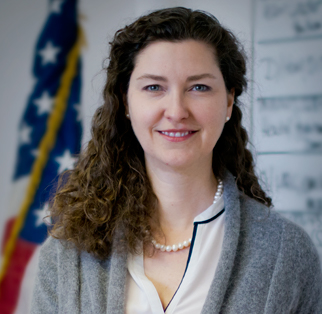Bringing her best game – to SIT and beyond
July 12th, 2017 | Careers, SIT Graduate Institute
Alumna Shannon Simrell works for democracy and human rights in Europe and Asia

During a junior year abroad from the University of Scranton, a new world of possibilities came into focus for Shannon Simrell. “Study abroad helped me see there was a world beyond my own that was accessible, a world where I could live, be welcomed, and create community.”
That newfound vision revealed how to turn an interest in language, culture, and travel into a career path. During the next six years, Shannon worked to empower individuals and community organizations to affect positive social change. She developed training exchange programs for Central European and former Soviet environmentalists, and at Budapest’s Central European University she engineered a practicum program for masters of environmental sciences students.
She then came to SIT Graduate Institute and received her MA in international education in 2002. Now, she lives in Vienna and works for PAE, a company that provides specialized personnel assistance and other support to the U.S. Departments of State and Defense.
As program manager of the REACT (Rapid Expert Assistance and Cooperation Teams) program, Shannon heads a small team recruiting U.S. experts to support democracy, human rights, and rule of law in central and southeastern Europe and Central Asia. REACT aids the U.S. mission to the Organization for Security and Cooperation in Europe (OSCE), whose 57 participant states from North America, Europe, the Caucasus, and Central Asia comprise the world’s largest regional security organization.
While she manages more than 100 full-time experts deployed to a dozen-plus countries, as well as more than 250 short-term volunteers, “A lot of my work focuses on recruiting experts to observe and report on the conflict in Eastern Ukraine,” Shannon says. “Part of the value of the REACT program is to provide experts who can report objectively to ensure the decisions of policymakers to applaud or to sanction are based on sound information.”
Before PAE, in 2005, Shannon worked in Kosovo as an interethnic dialogue consultant, hired by another alumni specifically for her SIT training in multicultural communications. In the wake of major interethnic conflicts across the Balkans, her job was “to bring community leaders from all of Kosovo’s ethnic groups into structured dialogue about the future of Kosovo’s communities.”
SIT prepared her for that challenging work. “What I learned at SIT was practical and useful. Beyond technical skills in adult education and training, the most enduring thing I take with me wherever I go is the key skill of organizational management, focusing on multi-functional team dynamics and intercultural communication skills. At SIT, I learned how to rally support and resources for important and complex ideas.”
At SIT, I learned how to rally support and resources for important and complex ideas.
Shannon explains organizational management as “a catch-all term for having the skills to be a change-maker. ”SIT, she said, offers an atmosphere and approach that makes it possible to take on such a big goal. In part, she sees SIT as “a physical space for developing an intentional community of people building the skills and a network of those who are committed to being the change we want to see in the world.”
To make that kind of community- and skills-building possible, she advises, “One must come to the SIT experience with self-knowledge and some practical foundation. You’ll get out of it only as much as you dare to invest in it.”
Shannon says learning from classmates’ and professors’ experiences is key at SIT. “The thread throughout my classes was that they were practical, relevant, and taught by contemporary practitioners. The professors were current in their fields and were bringing the real world into the classroom.”
“You have to bring your best game to SIT,” she says. “Be prepared to contribute. The world needs people who have a vision, but also an action plan for how to get there. I think SIT helped me to hone that.”
